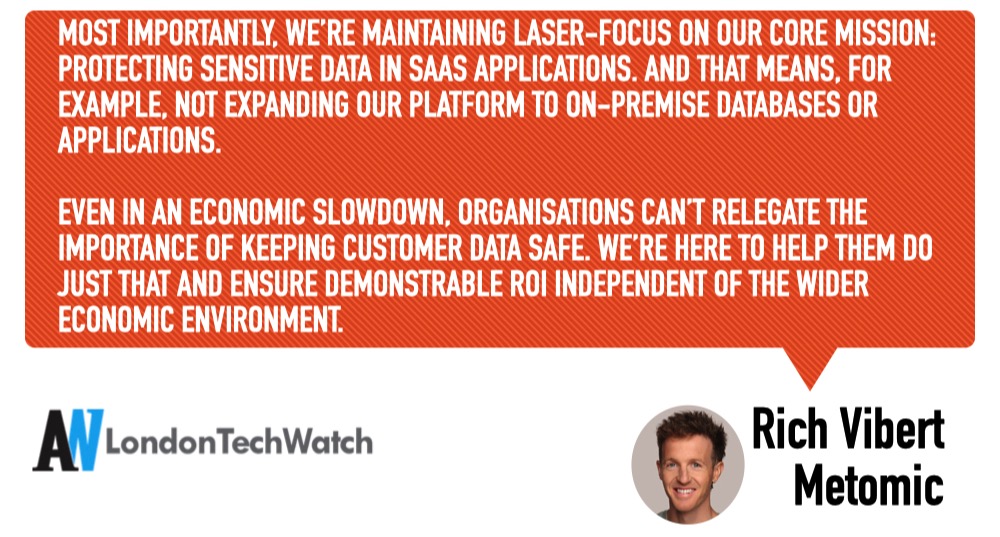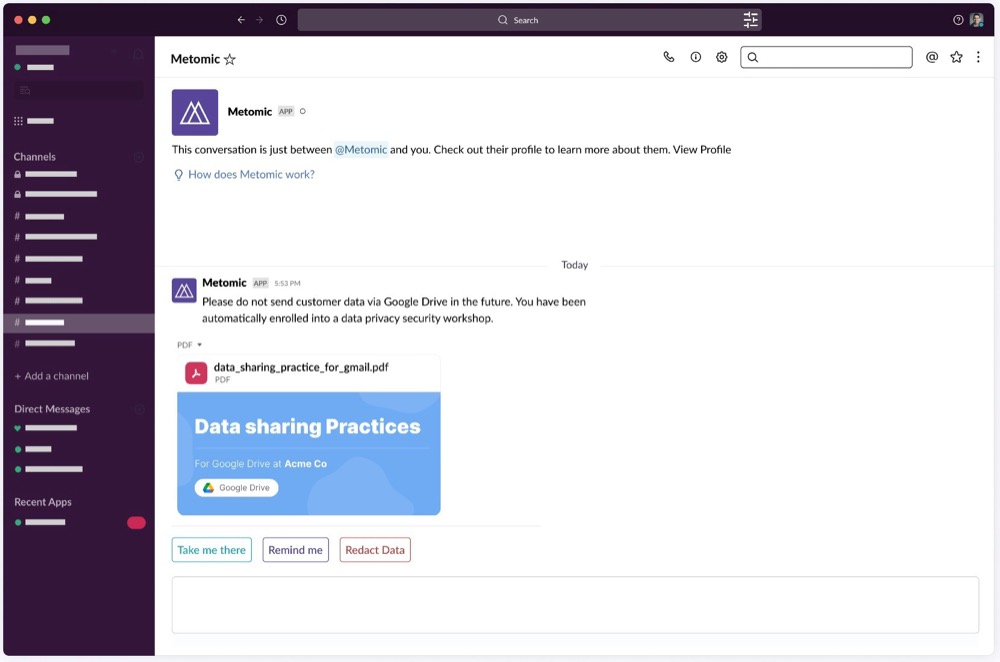The average company uses 137 unique SaaS applications on average. Figuring out how increased usage of these applications fits into a company’s security protocol ends up being a daunting task as each of these apps creates an opportunity for sensitive data to be at-risk. Metomic is a data security platform that allows security, privacy, and compliance teams to build no-code workflows to automate data policies across their SaaS stacks. The platform identifies, in real-time, when someone uploads sensitive data, whether personally identifiable information, confidential information, or security credentials, into SaaS applications and issues notifications to warn users and initiate remediation. In the last 18 months, Metomic has prevented 2M+ potential data leaks and identified hundreds of millions of data points that do not need to be on SaaS apps, minimizing at-risk data.
London TechWatch caught up with Metomic Cofounder and CEO Rich Vibert to learn more about the business, the company’s strategic plans, latest round of funding, which brings the company’s total funding raised to $25.8M, and much, much more…
Who were your investors and how much did you raise?
We raised a $20M Series A round. The round was led by Evolution Equity Partners with participation from Resonace.vc and Connect Ventures. We also had further backing from existing investors like Semantic.vc and Remote First Capital.
Tell us about your product or service.
Metomic helps companies reap the productivity and collaboration benefits of such popular apps as Slack, Google Apps, Jira, Notion, and ZenDesk, without exposing sensitive data to the wrong people and without getting in the way of employees doing their jobs. With one-click, our customers plug Metomic into their SaaS tools, like Slack and Google Drive, to uncover and remediate the most sensitive data risks lurking there.
What inspired the start of Metomic?
 My cofounder and I know first-hand how SaaS apps can accelerate collaboration and productivity – and even how sharing data can lead to much better decision-making within an organization. The question we asked ourselves was this: How can we make the most collaborative SaaS environments “safe” enough… even for security, privacy and compliance teams in the most highly-regulated industries? That’s the challenge we seek to address with Metomic.
My cofounder and I know first-hand how SaaS apps can accelerate collaboration and productivity – and even how sharing data can lead to much better decision-making within an organization. The question we asked ourselves was this: How can we make the most collaborative SaaS environments “safe” enough… even for security, privacy and compliance teams in the most highly-regulated industries? That’s the challenge we seek to address with Metomic.
After all, SaaS applications power modern organisations. These tools are fantastic at improving collaboration, providing first-class customer support, and building amazing products. But they come with risk. It’s too easy for teams to accidentally share sensitive data in the wrong place, or make it accessible to the wrong people. Metomic can help.
How is it different?
Traditional Data Loss Prevention techniques don’t work in SaaS. Security, privacy, and compliance teams don’t want to get in the way of employees doing their jobs by blocking the uploading and sharing of sensitive data.
The use of Metomic starts with visibility of sensitive data. It’s crazy to me that organisations don’t know what sensitive data is inside apps like Google Drive, and who has access to it. Providing that visibility itself gives our security and privacy teams a huge leg-up.
We also help them to automate prevention of critical risks occurring again in the future. When our platform really shines here is in relation to the Human Firewall, which puts risk remediation in the hands of employees with modern notifications delivered through their favorite communication channels like Slack. This gives security teams the most effective, scalable, and modern way to protect their most vulnerable data, without getting in the way of high-value work.
We also help them to automate prevention of critical risks occurring again in the future. When our platform really shines here is in relation to the Human Firewall, which puts risk remediation in the hands of employees with modern notifications delivered through their favorite communication channels like Slack. This gives security teams the most effective, scalable, and modern way to protect their most vulnerable data, without getting in the way of high-value work.
What market are you targeting and how big is it?
We help organisations that are using SaaS on a day-to-day basis. Tools like Slack, Google Drive, and Jira. This is already a staggering number of organisations, but our market is getting bigger as more companies rely on SaaS across all areas of their business.
What’s your business model?
Metomic protects sensitive data in SaaS. Our business model is based on the volume of data, its sensitivity levels, and the number of SaaS applications we’re protecting the data in. It’s really important to us that there’s demonstrable ROI in using Metomic.
How are you preparing for a potential economic slowdown?
Most importantly, we’re maintaining laser-focus on our core mission: protecting sensitive data in SaaS applications. And that means, for example, not expanding our platform to on-premise databases or applications.
Even in an economic slowdown, organisations can’t relegate the importance of keeping customer data safe. We’re here to help them do just that and ensure demonstrable ROI independent of the wider economic environment.
What was the funding process like?
Evolution was a great partner to work with throughout the fundraising process. They shared the same vision for the future of protecting sensitive data in SaaS applications, and we knew right away that they were the right fund to partner with on our next stage of growth. Particularly Yuval Ben-Itzhak, the partner who led the deal for Evolution, has an impressive background as an operator and we knew he’d provide a lot of value to us over the long term.
What are the biggest challenges that you faced while raising capital?
Protecting sensitive data at the data-layer itself – rather than the perimeter of where it’s being stored – is still a relatively new concept in the world of cybersecurity. When you’re developing a new market, it can be challenging to portray your vision of what this future market looks like. Especially for some investors that aren’t only investing in cybersecurity. Fortunately, there are many investors, like Evolution, that share a similar vision to ours.
What factors about your business led your investors to write the cheque?
We have been so laser-focused on our core mission of protecting sensitive data in SaaS, that our product has strong feedback from customers. There are still a lot of things we can be doing better, but listening to customers and staying focused have allowed us to develop a strong value proposition and momentum.
What are the milestones you plan to achieve in the next six months?
In terms of platform, we’re launching new integrations so we can protect sensitive data in more SaaS applications Notion and Airtable. We’re also making it easier for security, privacy and compliance teams to protect sensitive data in these apps without getting in the way of employees doing their jobs, with off-the-shelf policies and intuitive workflows.
What advice can you offer companies in London that do not have a fresh injection of capital in the bank?
Set clear-cut objectives of where you need to be by when, align your whole team around those, and work smart to get there.
Set clear-cut objectives of where you need to be by when, align your whole team around those, and work smart to get there.
Where do you see the company going now over the near term?
Most importantly we want to help more SaaS-enabled companies protect sensitive data in their SaaS applications. As more companies wake up to these problems, e.g. by finding a new Slack channel that has bots posting sensitive data into, we want them to come speak to Metomic in case we can help. We’re building up our go-to-market efforts around this.
We’re also expanding our team to the United States in 2023. We recently made our first hire over there we’re super excited to have a more physical presence where many of our customers already are today.
What is your favourite restaurant in London?
There are so many! I recently went to Brawn on Colombia Road and loved it – highly recommend it if you’re around the startup scene in Shoreditch.







